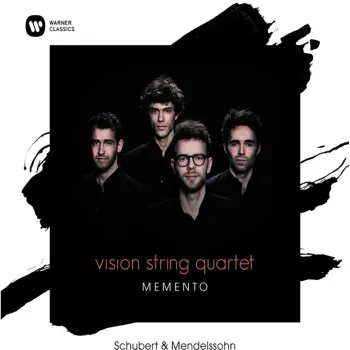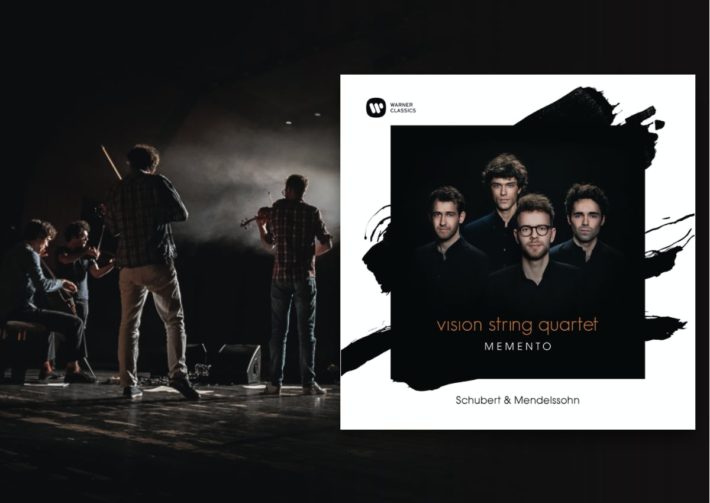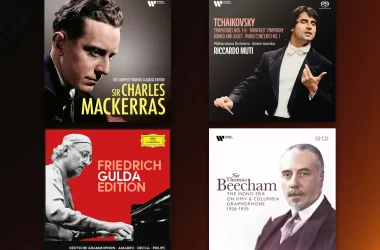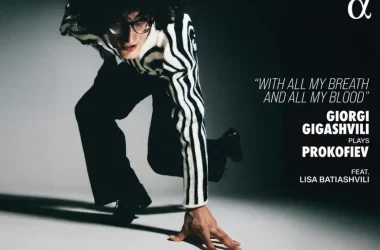The vision string quartet has won a few chamber music competitions (the Mendelssohn Competition in 2016 for instance), but they have bided their time with regard to recordings — this album is their first. Comprising two famous and rather dark string quartets, Schubert’s “Death and the Maiden” and Menelssohn’s Sixth Quartet Op. 80, the album is indeed, as they write in their liner notes, “entirely personal.”

The quartet has a few interesting quirks that help make clear what is so personal about their playing. They perform many, if not all, of their concerts standing up (save the cellist) and they memorize their parts. The main photo on their website shows them jamming in an abandoned but attractive building, in the basin of what was once, maybe, a pool. Their YouTube channel has some goofy narrative-based videos, and the album’s liner notes use a smiley emoji. All of this to say, the vision string quartet (yes, in all lowercase) are serious performers with deep personality. They have a good sense of humor, and a good grasp of aesthetics.
How, then, does all this come through in the music? Schubert’s D Minor quartet is quite serious, and can tend towards the overly-dramatic, especially in the first movement; here instead is an introverted Allegro. The opening chords are clean, forceful but not outwardly brash. Differences in rubato between bars 4-5 and 5-6 instantly create a reflective mood. In the first theme, the quartet seems to play as a single unit, their tone color unified, phrasing flattened to create almost a minimalist effect. In the second, their playing is still unified, but airy, plump accents give the line more shape. In the coda, their chorale is eerily quiet, dark and spacious (9’30”).
Their playing couldn’t contrast more strongly with the Pavel Haas quartet’s recent take on this piece; Haas plays with abandon, and brings out the counterpoint between Schubert’s lines. Vision’s playing does occasionally become monochromatic in the development; I wanted them to take me somewhere different, and bring me back with the recapitulation. It can be done, as in the Berg quartet’s masterful 1984 version, but it’s admittedly quite difficult.
Vision evoke more colors in the second movement’s variations, based on the work’s eponymous theme. The music is diaphanous at first, so delicate as to be hardly tangible. Something substantial then emerges over the first few variations, beginning with first violinist Jakob Encke’s refined and touching solo (what finesse on the high B!), moving to cellist Leonard Disselhorst’s plangent version in the tenor range, and arriving at a galloping fortissimo that nonetheless retains a lightness. The major variation is pleasantly weary after the exertion. I can’t think of any other quartet that achieves such a clear narrative in this movement, or such delicacy of touch.
The violent Scherzo contains the most extroverted and aggressive playing of the album. There are three or four colors going on at once, each player’s sound embodying the spirit of the musical line. This continues into the dainty Trio, but painting an entirely different picture. Thick strokes of acrylic turn into wisps of watercolors. Or, to use a more tactile metaphor, I could almost feel different items in my palm: heavy brushes with metal bristles vs. thin, delicate shells of sugar. It was a wonderful sensation. In the finale that follows, the quartet again looks inwards, playing with a heightened hush. As in the first movement, the digressions don’t quite go far enough to be breathtaking. Much of that has to do with articulation; the dynamics and vibrato quality certainly change, but phrases remain too flat in articulation to really pop. The Haas and Berg quartets demonstrate these desired changes nicely.
Mendelssohn wrote his F minor quartet (Op. 80) after his sister Fanny’s death, making it a fitting (if morbid) companion for the Schubert. Throughout the first movement, vision struggles to generate enough drama. Compare their playing to the Elias Quartet’s 2007 version in the first theme, where a crescendo to sforzando is followed by a lilting piano. Vision’s piano goes somewhere else entirely, defusing the drama simply by ignoring it, whereas Elias’ is more connected to what came before, as if shaken but resolved to go on (0’25” in both). At the crescendo to the recapitulation, Elias is full of fear (thick vibrato, sharp attacks) while vision doesn’t muster much.
The second movement is catchy, and its trademarks are all dramatically and sharply excecuted – the hemiolas, the humor, and the meandering bass line. The third Adagio movement is also well-played, the dialogue between cello and first violin appropriately balanced. But both lack a sense of stakes, of danger, of a brother having just lost his sister, if you will. The Finale is more successful, as Mendelssohn’s writing naturally draws out different textures from the quartet. The ghostly calm of the pianos works nicely against the flickering tremolos and sharp arpeggios of the main theme.
Recorded in Sendesaal Bremen, this album features a wonderfully intimate sound quality, especially in the quiet moments, but resonance is not lost in the fortes. These versions of Schubert and Mendelssohn will not suit all tastes (especially conservative ones), but offer something truly special nonetheless, the Schubert being particularly recommended.
“Memento”
Schubert – String Quartet No. 14 (“Death and the Maiden”), D.810
Mendelssohn – String Quartet No. 6, Op. 80
vision string quartet:
Jakob Encke – Violin
Daniel Stoll – Violin
Sander Stuart – Viola
Leonard Disselhorst – Cello
Warner Classics, CD 9029530955




















